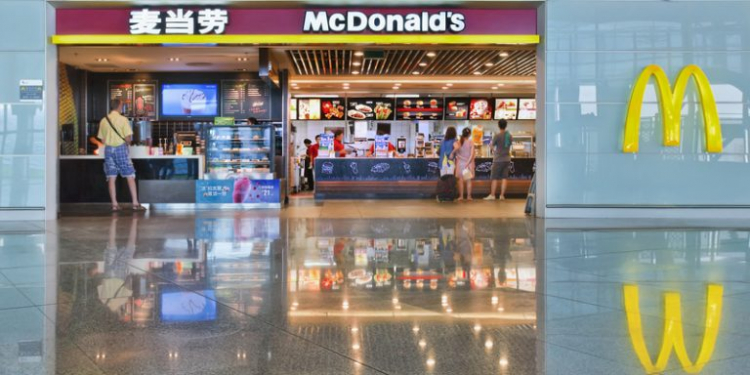Emerging markets have provided double-digit returns for McDonalds as sales begin to decline in the US and Europe. McDonalds (MCD) has expanded aggressively in countries such as Malaysia, South Korea and China.
The company plans to open more than 1,500 restaurants in China and Korea with local partners over the next five years as it refocuses on expansion in the world’s second-biggest economy. Post expansion, the company would operate nearly 4,300 stores in these countries, 54% higher than its current 2,800. China and South Korea make up 7.8% of McDonald’s store count.
The restaurant chain can start implementing its growth strategy in China, as it completes its partnership with CITIC Limited and The Carlyle Group.
The new partnership will operate and manage McDonald’s businesses in mainland China and Hong Kong, leveraging combined expertise and strength to drive an expansion strategy, the foodservice giant announced.
Termed “Vision 2022”, the strategy aims to drive double-digit sales growth in each of the next five years by increasing the number of restaurants from 2,500 to 4,500. The plan includes delivery hub coverage of over 75% of restaurants, by the end of 2022, bringing convenience to Chinese customers.
Opening pace of new McDonald’s restaurants in mainland China is expected to progressively ramp up from approximately 250 per year in 2017 to 500 per year in 2022, under the new partnership. In addition, Vision 2022 includes plans to significantly increase McDonald’s restaurant portfolio mix in tier 3-4 cities to approximately 45% of all McDonald’s restaurants in China. Vision 2022 also includes an increase of “Experience of the Future” restaurants to over 90%, which will enable the brand to offer digitalized and personalized dining experience to more customers.
With innovation hubs located in Hong Kong and Shanghai, McDonald’s will strengthen its brand leadership by enhancing the customer experience using menu innovation and advanced digital retail experience.
Furthermore, McDonald’s plans to double its presence over the next 10 years in Malaysia. The company has committed investments of USD325m to open 188 outlets by 2025, which would increase its Malaysian store count to 450. McDonald’s generated USD24.2bn in revenues in 2016. Year to date, shares of McDonald’s have gained 30.4% making it the best performer among its peers, according to the company Frontera News.
Other brands planning expansion
Yum Brands (YUM) (YUMC), the parent company of large fast-food chains like Pizza Hut, KFC and Taco Bell generates nearly 50% of its revenues from developing countries.
“We believe we have a long runway for growth in emerging markets like China, India, Africa, Russia, Indonesia, Vietnam and many others,” a Yum spokeswoman said in email. In the top 10 emerging markets, Yum Brands has just two stores per million people —compared with 58 stores per million in the U.S. About 95% of the chain’s 6,700 locations are in the U.S.
Yum Brands owned Taco Bell recently announced plans to operate 9,000 global restaurants over the next 5 years, which equates to opening an average of 500 restaurants each year, much higher than its previous record of 200 restaurant per year. The franchisee plans to expand aggressively in Canada, China, Brazil and India along with entry into new countries.
Taco Bell also partnered with Sri Lanka franchisee Gamma Pizzakraft Lanka (Pvt) Ltd to open its first restaurant in Sri Lanka. The company entered India several years ago and had no less than 13 restaurants by 2016.
Pizza Hut, also owned by Yum Brands, has inked a deal with Ethiopia’s Belayab Foods and Franchise PLC to open 10 Pizza Hut restaurants as part of its expansion plans in Africa. “We will start off with three outlets first in six months time and open 10 stores within the next three years,” Michael Ghebru, a shareholder of the project, told Reuters.
Kentucky-based Yum already operates nearly 1,000 restaurants in Africa while Pizza Hut is in nearly 188 locations across Africa. “Let’s be prudent because in Africa there may be some levels of instability and also when you are opening some routes that take time,” Ewan Davenport, General Manager of Pizza Hut Africa, said. The company plans to open 50 stores annually in Africa.
Credit Suisse analysts are bullish on Yum Brands on the back of Taco Bell’s international expansion strategy. Taco Bells represents nearly 30% of Yum Brands’ profits and makes up only 15% of Yum’s international portfolio.
“[Taco Bell] made the most compelling and realistic case for international unit growth acceleration we’ve heard in 10 years of covering YUM,” Credit Suisse analysts Jason West and Jordy Winslow mentioned in an investors note. “Franchisee interest in unit development continues to grow, and there are multiple levers of comp growth in the pipeline.” The analysts also raised the target price on Yum Brands to USD78 from USD75 earlier. Currently, 11 sell-side analysts have assigned “buy” to Yum Brands, while 16 assigned hold ratings. Year to date, shares of Yum Brands have gained 22.6%. Yum Brands have a 12-month consensus price target of USD77.7 indicating an upside potential of 4%.






